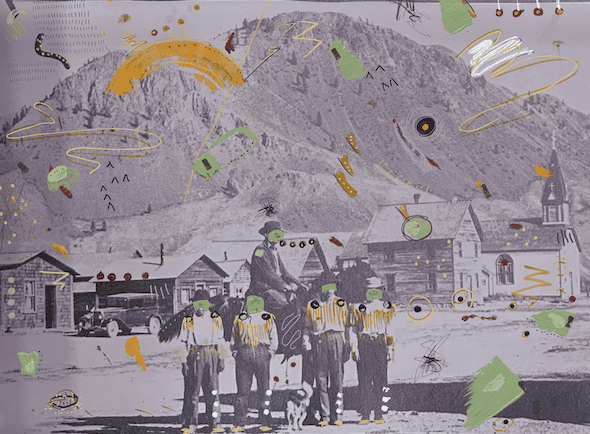- About
- Research
-
-
- Special Reports & Features
- Braiding Accountability: A Ten-Year Review of the TRC’s Healthcare Calls to Action
- Buried Burdens: The True Costs of Liquified Natural Gas (LNG) Ownership
- Pretendians and Publications: The Problem and Solutions to Redface Research
- Pinasunniq: Reflections on a Northern Indigenous Economy
- From Risk to Resilience: Indigenous Alternatives to Climate Risk Assessment in Canada
- Twenty-Five Years of Gladue: Indigenous ‘Over-Incarceration’ & the Failure of the Criminal Justice System on the Grand River
- Calls to Action Accountability: A 2023 Status Update on Reconciliation
- View all reports.
- Special Reports & Features
-
-
- Yellowhead School
-
- The Treaty Map
- LIBRARY
- Submissions
- Donate
WHY IS IT so hard for Canada to implement the Truth and Reconciliation Commission’s 94 Calls to Action? While there are a lot of Calls, it has been eight years since they were released, and only 13 have been completed. A new body proposed by the TRC itself may soon materialize and take up the work of answering this question, among others. But will it have the tools necessary to hold the government — and Canadians — accountable?
Over the past year, the Senate Committee on Indigenous Peoples has debated Bill C-29 — legislation proposed by the Federal Government that could fulfill the TRC’s Call to Action 53 to establish a National Council for Reconciliation.
This Call to Action envisions a Council that will act as an independent, national oversight body that will monitor, evaluate, and report annually on progress toward reconciliation across all sectors of society to ensure government accountability in a post-apology era of reconciliation. Related, Calls 54-56 detail resources that the Council should be equipped with to manage the scope of its expected role. Call 54, for instance, outlines the funds that should be allocated, 55 focuses on the data and information the Council requires, and 56 details how the Prime Minister should respond and relate to the Council.
This set of Calls to Action is critical: A body tasked to evaluate Canada’s progress on reconciliation and provide some form of accountability for promises made to residential school survivors and their descendants has been markedly absent.
The Challenge of Accountability
Without a Council to monitor progress on reconciliation in Canada, external organizations, including Yellowhead Institute, among others, have been forced to take on the burden of accountability work.
The process of tracking the Calls to Action progress and completion has been difficult, largely due to a lack of sufficient data required to not only assess Canada’s progress in reconciliation but also gather the critical information needed to gauge the scope of systemic inequalities experienced by Indigenous communities. Arguably, the Calls related to the National Council should have been among the first the Canadian government completed, because the Council will be tasked with the data tracking and monitoring necessary to begin reconciliatory efforts and assess their effectiveness.
But is the National Council shaping up to be the accountability mechanism initially envisioned by Survivors?
According to Eva Jewell and Ian Mosby’s annual Calls to Action Accountability reports, there are five consistent barriers to reconciliation: 1) Insufficient resources; 2) Paternalism; 3) Reconciliation as exploitation and performance; 4) Systemic Racism; and 5) Prioritizing the Canadian “public interest.” Does the National Council provide hope for overcoming barriers that have so far prevented meaningful reconciliation, or will it maintain them?
Money Money Money
Call to Action 54 calls upon the Government of Canada to provide multi-year funding for the National Council for Reconciliation and suggests establishing a trust to ensure the Council has the financial, human, and technical resources required to conduct its work. Instead, a $126.5 million endowment for the Council has been announced, and the expectation is that it will operate as a non-profit, which will therefore include the added responsibility of determining how long-term funding will be secured.
Simply put, the amount allocated for the Council is insufficient for its monumental tasks, which will include, alongside other responsibilities, monitoring, evaluating, and reporting on the state of reconciliation in Canada across all sectors of society; developing and implementing a multi-year National Action Plan for reconciliation; and promoting public dialogue and initiatives for reconciliation. As David McDonald reminded the Senate Standing Committee on Indigenous Peoples, the Council will require significant and ongoing funds to maintain a staff of researchers to collect data and develop dedicated monitoring mechanisms. The precarious funding arrangement proposed could, therefore, lead to uncertainty about the Council’s sustainability.
Insufficient resources have been an observed barrier to reconciliation over the past eight years, consistently limiting meaningful change in critical areas such as child welfare, health, education, and justice. Former TRC commissioner Marie Wilson also expressed concern with the neglect of Call to Action 54 in the Bill, stating, “Without the money and the means, everything can become politicized and fragile where this needs to be permanent and stable… This cannot be another perceived destitute organization trying to work miracles on a shoestring.”

Image by Jaz Whitford
Data Data Data
In addition to a scarcity of funds, the National Council is also hindered by a scarcity of data. Call to Action 55 specifically calls upon all levels of government to provide any current data and information requested by the National Council so it can effectively report on progress in reconciliation. Necessary data includes information relating to Indigenous children in child welfare, funding for the education of First Nations children on and off reserves, data outlining health gaps between Indigenous and non-Indigenous communities, and more.
However, Bill C-29 avoids equipping the Council with the powers necessary to compel the government to release and/or produce this data. Numerous witnesses at the committee, including Cassidy Caron and Hillory Tenute, testified that to truly hold the government accountable to reconciliatory promises, greater authority is required, including the ability to administer subpoenas in order to access the data needed. In fact, it has been proposed that the Council have the judicial powers and permanent status of a tribunal.
Without those powers, the Council will find itself treading familiar ground. The TRC, for example, was forced to take Canada to court over the Government’s refusal to release records relating to residential school requests.
As Jewell and Mosby noticed early in their analysis of Canada’s progress toward completing the Calls to Action, there is resistance to sharing data that would highlight Canada’s ongoing failures to complete Calls to Action. Accompanying this resistance is an unwillingness to acknowledge that the unequal treatment of Indigenous peoples is the product of systemically racist institutions and structures that require transformation.
Can we really expect the Council to effectively measure reconciliation without any data?
Reconciliation as Exploitation?
Attempts by Conservative senators to prioritize “economic reconciliation” in Bill C-29’s debates reveal a familiar barrier of “reconciliation as exploitation.” So-called “economic reconciliation” has been defined within the Bill’s debates as “a process wherein First Nations benefit from the resources extracted from their lands and waters to build their own wealth and have access to wealth derived from those resources.” It has been constantly pushed that economic reconciliation needs to be centred in the Bill, with Conservative Party members advocating for a reserved seat for an individual dedicated to “economic reconciliation” on the Council of only 9–12 members.
But the term “economic reconciliation” has little to do with the existing 94 Calls to Action. In fact, the term doesn’t appear at all in the multi-volume TRC Final Report or in any of the Calls to Action themselves. Only a singular subsection of a Call (92.ii) contains a reference to economic reconciliation. Yet this Call is directed at “the corporate sector in Canada” and premised upon their adoption of the United Nations Declaration on the Rights of Indigenous Peoples.
Canada’s wealth, meanwhile, stems from the violent theft of land from Indigenous peoples. The restitution of Indigenous economies is therefore critical to supporting Indigenous life. However, the attempt to centre a purely capitalist interpretation of “economic reconciliation” in Bill C-29, when it does not appear in the TRC’s work, is an example of predatory, exploitative reconciliatory efforts to pursue a specific agenda.
Reconciliation as Performance?
Last year, the now-Minister of Crown-Indigenous relations, Gary Anandasangaree, was asked by MP Leah Gazan if he agrees that reconciliation is demonstrated through action and not rhetoric, offering that only 13 out of 94 Calls to Action have been completed so far (a number in alignment with Yellowhead’s analysis). To this, Anandasangaree responded, “I do not believe it is just 13 completed, and that is the reason we need a council that can objectively give us a sense of where we are at with the Calls to Action.”
This statement is troubling for a number of reasons. Foremost among them is that Anandasangaree is discounting the near-consensus of Indigenous analysis on the Calls to Action by implying it is not objective. Are Indigenous people not capable of objectivity in this case, versus Canadians?
Also troubling is that the Bill proposes to empower Anandasangaree to appoint two-thirds of the members of the National Council. Given his statements, we can expect that his vision of “objectivity” will be prioritized in the selection of the Council members. In practice, that is very likely to mean “objective” individuals are, conveniently, those also supportive of the government’s agenda. Indeed, this process in the legislation has been criticized as paternalistic; it also fits within a longstanding pattern in Canada where “reconciliation” is co-opted by settler governments, institutions, and businesses and becomes more about performance than substantive change.
Outstanding Questions in the Bill C-29 Debate
As Parliament has resumed for the fall sitting, the Senate will continue to debate the National Council’s structure and mandate before proposing changes (if any) and sending the Bill back to the House of Commons. For the legislation to actually empower the National Council and avoid the common aversions to reconciliation highlighted by Jewell and Mosby outstanding questions remain:
- Will the Council be equipped with the resources it needs to succeed, including powers to access data and sufficient resources to function effectively?
- How will the design of the National Council avoid critiques of paternalism in the relationship with the Crown-Indigenous Relations Minister or cabinet more broadly?
- Will the National Council be insulated from co-option for government exploitation and performance?
Will the Senate ask these questions and form enough of a consensus to challenge the government’s legislation? If not, we can expect a National Council with a narrow mandate, limited tools to undertake its work, and very likely existing as a shield to hide government inaction.
To be effective, the National Council must ensure government accountability for the promises made to Survivors. But more than that, it also should be about taking care of Survivors, descendants, and communities who have fought this long to be heard. Part of that care should include relief for Indigenous communities, organizations, and individuals forced to constantly fight Canada to make the structural changes outlined in the Calls to Action and lead, finally, to transformation in the collective relationship.
Balaban, Kelsi-Leigh. A National Council for Reconciliation: The Challenges and Opportunities, Yellowhead Institute. 28 Sept 2023. https://yellowheadinstitute.org/2023/09/28/a-national-council-for-reconciliation/
Image Credit: Jaz Whitford (in collaboration w/Jaye Simpson: Manifest Defenestration)

